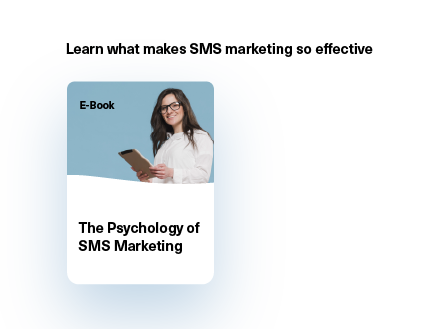Even though SMS communication has been around for some thirty years, it's as popular as ever. And businesses are increasingly recognising this fact – more and more are utilising SMS to improve the customer experience and boost sales.
Read on to learn how SMS works and the benefits of this channel compared to others. You'll discover some surprising SMS marketing statistics demonstrating just how effective SMS communication is, plus see examples of real-life business texts.
What is SMS communication, and how does it work?
SMS stands for Short Message Service. It's the original form of messaging - every mobile phone has a native text message app.
Text messages are sent and received over a cellular network. When you send a text from your device, it gets transmitted to the nearest cell tower, where it's then passed on to an SMS service centre (SMSC). From there, the text is transmitted to another cell tower near the receiving device. This cell tower completes the last step, sending it to the recipient's handset.
Benefits of SMS messages vs other messaging channels
Because text messages are sent over a cellular network, message deliverability is more reliable compared to other channels that rely on the internet (e.g., email, WhatsApp, Facebook Messenger).
Even if your customers' mobile phones are switched off or out of signal range, your text will be sent as soon as they're switched on or a signal becomes available. But this isn't the only advantage of SMS communication. Text messaging is:
Very direct – most people keep their phones within reach, so an SMS text is practically delivered straight into your customer's hands. Plus, the customer doesn't need to download an app to access and read it.
Easy to read – today's busy consumer doesn't have time to read through lengthy content (at least not right away). SMS notifications are, by nature, very short – you're forced to get your message across in a sentence or two, which is actually more helpful for the customer.
Cheap – compared to traditional marketing methods, text messaging is is cost-effective, especially if you need to send a high volume of messages, as it usually becomes cheaper with the more texts you send. Other marketing strategies, like paid online ads and print media, are costly and not necessarily as well-targeted.
Far-reaching – 7.26 billion people worldwide now own a mobile phone capable of sending and receiving text messages, making SMS a globally adopted communication channel. This number is far higher than the number of people who have access to the internet.
Relatively spam resistant – compared to email, SMS has more chance of getting through spam filters. Email often gets routed to the junk folder, even if the message content isn't actually spam.
Eye-opening business SMS messaging statistics
If the above benefits aren't enough to convince you that SMS texting is something you should consider for your business, these interesting statistics and trends might:
82% of U.S. smartphone owners read every SMS message they're sent.
95% of texts are read within three minutes of being sent (and the average response time is 90 seconds).
The majority of millennial smartphone users prefer businesses to have texting capabilities for customer service.
77% of consumers have a positive perception of companies that use SMS.
50% of U.S. internet users say they prefer to receive loyalty programme updates by text to their mobile phones.
45% of SMS campaigns achieve a successful ROI, with this figure increasing to over 50% when combined with other channels like email and social media.
How text messages are used in business
There are two main types of business communications you can send via SMS: transactional and marketing messages.
Transactional messages are non-promotional communications, triggered in response to a customer interacting with your company – where the communication is critical to the success of your business operations.
For example, order confirmations, delivery updates, appointment reminders, one-time passwords for 2FA and emergency alerts are types of transactional messages.
Marketing texts are purely promotional. Flash sale alerts, special offers, loyalty programmes, new product launches and customer review requests are all types of SMS marketing campaigns. Our blog post on setting up text alerts for businesses can provide you with more insights on the matter.
If you want to carry out SMS marketing, your customers will need to opt-in. And that means you'll need to obtain express written permission from them before you can start sending texts to their mobile devices (but you don't have to do this with transactional texts).
Types of business SMS communications
Here are some examples of SMS marketing and transactional messages commonly used by businesses:
Marketing SMS:
What better way to treat that special lady in your life this Mother's Day than with our 3-course dinner deal with a FREE glass of wine. See the menu: [URL]
Great news! Our latest new and used vehicle offers are now available to view on our website: [URL]
Hi Hadrian, we hope you're enjoying your new sofa. Please take a moment and tell us about your experience of ordering from us here: [URL]
As a thank you for being a valued customer, Bella, we'd like to give you 15% off your next purchase with us. Browse what's new in-store: [URL]
Transactional SMS:
Hi Yusuf, your grocery order scheduled for 2:00pm - 4:00pm is now out for delivery. You can no longer make changes to your order.
Hi Luca, we've just delivered your grocery order. Was everything OK? To tell us about a problem, visit: [URL].
123456 is your verification code. It will be valid for 10 minutes. Please do not share this code with anyone.
Mia, your dental appointment is on 30/03/22 at 11:30 am. Need to rearrange? Send us a message: [URL]
Examples of brands using SMS messages
It's not just big enterprises that can utilise SMS text messages. Smaller businesses can also justify this channel because it provides such affordable results. Here are some real-life examples of brands using SMS.
Local restaurant – to confirm a dinner reservation
Mattress retailer – to request feedback on their service
Energy provider – to remind customers about submitting meter readings
Mobile phone provider – to promote a new product
Leverage the power of SMS for your business
Although texting has been around for decades, SMS remains a powerful tool for businesses large and small. It's one of the most direct ways to reach customers, and because texts are sent and received almost instantly, this channel is ideal for time-sensitive content.
SMS is cost-effective compared to several other channels. Check out Messente's pricing to get an idea of what it'll cost you to text phone numbers in different countries. Then, when you're ready, register for your free Messente account to explore how our SMS API works.









